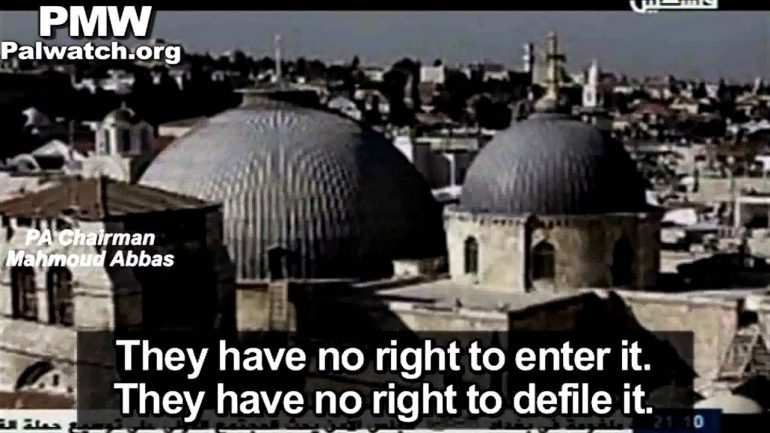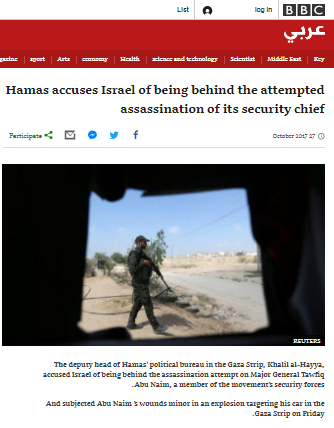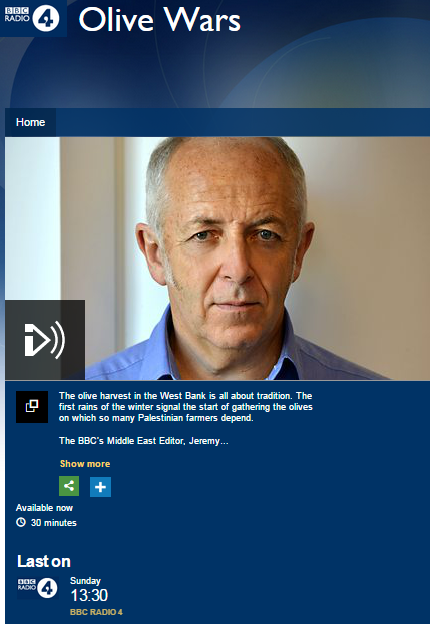“No-one becomes a terrorist from a standing start. It starts with a process of radicalisation. When you look in detail at the backgrounds of those convicted of terrorist offences, it is clear that many of them were first influenced by what some would call non-violent extremists.
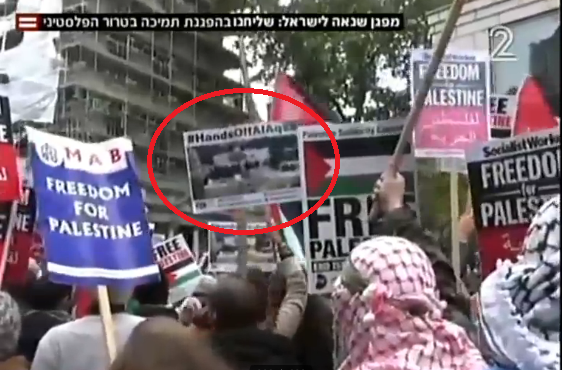
It may begin with hearing about the so-called Jewish conspiracy and then develop into hostility to the West and fundamental liberal values, before finally becoming a cultish attachment to death. Put another way, the extremist world view is the gateway, and violence is the ultimate destination. […]
First, any strategy to defeat extremism must confront, head on, the extreme ideology that underpins it. We must take its component parts to pieces – the cultish worldview, the conspiracy theories, and yes, the so-called glamorous parts of it as well.
We must demand that people also condemn the wild conspiracy theories, the anti-Semitism, and the sectarianism too.” (PM David Cameron, July 2015)
Over the past few weeks a particularly inflammatory conspiracy theory has been repeatedly amplified on a variety of BBC platforms. According to that conspiracy theory, Israel seeks or intends to change the status quo on Temple Mount and whilst assorted versions of that libel have been published and broadcast by the BBC, the corporation has to date not told its audiences in its own words that they are baseless. At best, it has opted to tell them that “Israel says” it has no intention of changing the status quo at the site. At worst, it has lent the BBC’s reputation of reliability to such lies.
One example of unchallenged amplification of that conspiracy theory came in a filmed report by Yolande Knell on October 13th. Two days later, the BBC Radio 4 programme ‘From Our Own Correspondent’ broadcast an item by Knell (available from 00:44 here) which – among other things – again promoted the words of the same interviewee.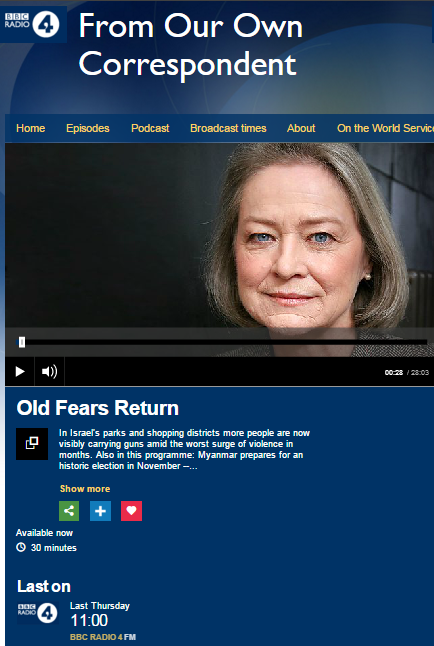
Presenter Kate Adie’s introduction to the item was notable for her use of qualifying terms to describe terrorists and violent rioters – including minors.
KA: “The Israeli army has been deploying hundreds of troops across the country to try to combat the worst surge in violence there in months. Yesterday police in Jerusalem shot dead two Palestinians who they say tried to stab Israelis in separate incidents. So far this month, seven Israelis have been killed in attacks and at least thirty Palestinians have died – including alleged assailants and several children.” [emphasis added]
Adie continued, failing to provide listeners with the full story behind Mahmoud Abbas’ remarks.
“The Palestinian Authority president Mahmoud Abbas accused Israel of executing Palestinian children in cold blood – a remark denounced as lies and incitement by the Israeli Prime Minister Benjamin Netanyahu. Yolande Knell says the violence if fueling a sense of panic in Israel and raising fears of a new Palestinian Intifada, or uprising.”
Yolande Knell’s relatively long account began as follows: [all emphasis in bold added]
YK: “It’s a scene so familiar that it could be from almost any time over the past three decades. Palestinian teenagers wearing jeans and T-shirts and checkered keffiyeh scarves fling stones and marbles at heavily armed Israeli soldiers. And today there’s a swift response: an army jeep tears down this hotel-lined road in Bethlehem, firing out white ribbons of tear gas. Soon we hear the crack of gunfire. Recently there’ve been almost daily battles like this across the occupied Palestinian territories.
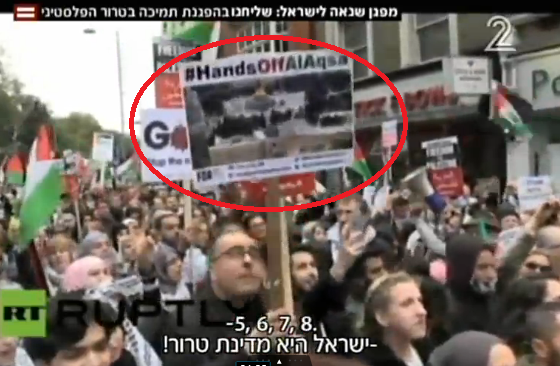
The anger’s fueled by a row over access to al Aqsa Mosque in Jerusalem’s Old City which is built in a place that’s both sacred to Muslims and Jews. Despite official Israeli denials, many Palestinians believe there’s a plan to change long-standing rules and give Jews the right to pray openly at the site they call Temple Mount.
‘This started because Israelis entered our al Aqsa Mosque and disrespected it’ a young protester Ahmed tells me, referring to an incident last month. During a Jewish holiday, Palestinian worshippers clashed with Israeli troops after the forces went briefly inside the mosque in response – they say – to stone-throwing rioters.”
Knell’s description of violent rioters as “worshippers” is obviously misleading, as is her attempt to claim that the rioting was caused by the actions of the Israeli police. All the incidents in which the police have been obliged to keep order at the site over the last weeks began because of organised Palestinian attempts to violently disrupt visits by non-Muslims to the site. This of course is not the first time that Knell has misrepresented those events. The report continues with Knell once again amplifying the particularly inflammatory falsehood that Israel is conducting a “fight” against Islam.
“‘It’s a red line’ Ahmed goes on. ‘All our lives we’ve been dealing with Israel’s occupation as a political struggle but now they’re turning it into a fight against our religion’. The activist has already spent four years in an Israeli prison for rock throwing. Now he hopes for a third Palestinian uprising and tells me he’s ready to go back to jail. On a nearby street I also meet Mustafa who’s 25 and says he’s prepared to die for the nationalist cause. ‘I like to go and throw stones and whatever happens, happens’ he remarks. ‘It’s for al Aqsa, it’s for our martyrs and all our humiliations’.”
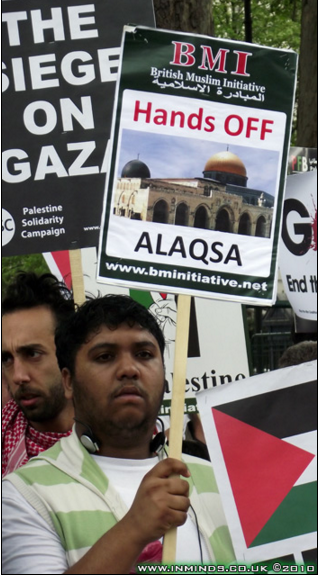
Next, Knell revisits one of her regular themes: misrepresenting the anti-terrorist fence in the vicinity of Bethlehem whilst failing to clarify to audiences that it exists because of Palestinian terrorism.
“The shop worker describes a daily life where he’s hemmed-in by checkpoints, by the concrete wall that surrounds much of Bethlehem – part of Israel’s separation barrier – and expanding Jewish settlements near his home on the edge of the city. Despite his university education, his career prospects are limited. Mustafa connects his feelings of anger to local unrest in the West Bank and the recent spate of knife attacks and shootings across Jerusalem and Israel. Amateur video of almost every assault is posted on social media and he watches them all. ‘Maybe this will be the stabbing Intifada’ he says.”
Downplaying the violence of the first Intifada – during which around a thousand Palestinians were murdered by Palestinian vigilantes – Knell goes on:
“The first Palestinian Intifada which began in 1987 was marked by coordinated popular unrest while the second, starting from 2000, produced suicide bombings by militants. Together, they claimed the lives of over 5,000 Palestinians and over 1,100 Israelis. The latest stabbings have so far caused several deaths and dozens of injuries. Police blame most on lone-wolf attackers making personal decisions to act. But while the intensity and pattern of the violence may not match the experience of previous uprisings, it’s stirred up old fears for Israelis.” […]
Knell’s closing words include whitewashing of the incitement coming from Mahmoud Abbas and completely ignore the issue of incitement from official PA and other Palestinian sources.
“The Israeli authorities have struggled in their response to the recent crisis. Some far-right politicians are demanding action over Temple Mount. Meanwhile, security officials and the Israeli prime minister have largely held back – worried about exacerbating the troubles. On the Palestinian side, Islamist groups have declared the attacks heroic while the ageing secular president says he supports popular protests but not violence. The current unrest isn’t organized in any meaningful sense. It has no clear and unified goal. It comes as a generation of young Palestinians have lost faith in their leaders. They’ve watched peace talks fail to deliver a promised independent Palestinian state. For all those reasons, it’s very hard to predict what will happen next and whether those who are trying to bring the situation under control really can do so.”
Of course listeners to this programme would be incapable of putting Knell’s makeover of Mahmoud Abbas into its appropriate context because the BBC has studiously refrained from informing its audiences of what “secular” Mahmoud Abbas says to his people in Arabic.
This message, for example, was broadcast on PA TV nineteen times in three days during October 2014.
More recently, this was shown on official PA TV:
Obviously, the fact that the BBC gives unchallenged amplification to conspiracy theories concerning Temple Mount is a problem. The fact that it also refrains from clarifying to its audiences in its own words that Israel has no intention of changing the status quo at that site is another, as is the fact that the BBC has consistently concealed from its audiences the religiously themed rhetoric and incitement fueling the conspiracy theories surrounding Temple Mount.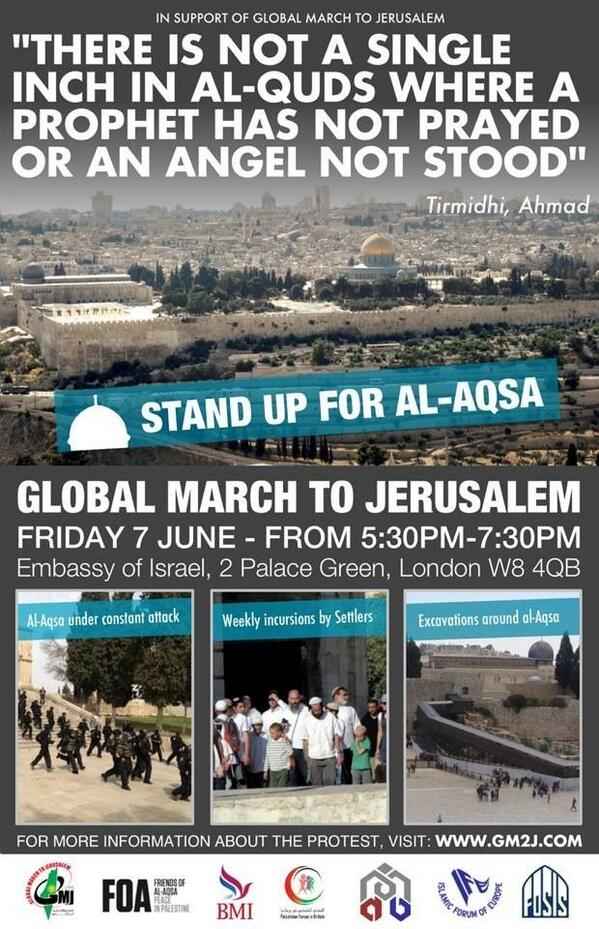
Those problems do not just raise questions about the BBC’s ability to report on this Israel-related topic accurately, impartially and responsibly. They also have the potential to affect British domestic issues because conspiracy theories about Temple Mount and al Aqsa Mosque are by no means confined to the Middle East – as this page from the website of the Leicester-based group ‘Friends of Al Aqsa’ and scenes from the anti-Israel rally held in London just last weekend demonstrate.
Prime Minister David Cameron clearly understands that a vital part of combating extremism in the UK is confronting and exposing conspiracy theories. With its unrivalled outreach, the BBC is of course well placed to play a part in contributing to that aim – should it so choose.

